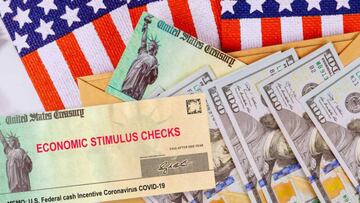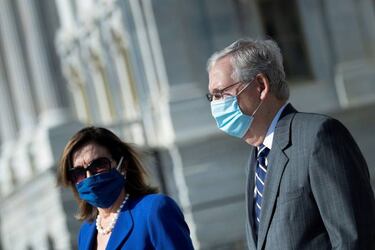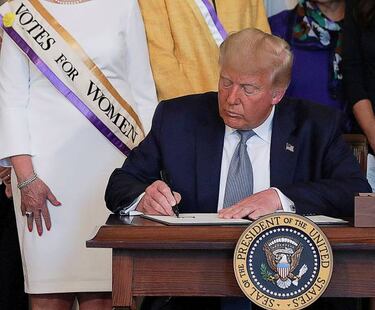Second stimulus check: what's the difference between HEALS ACT and HEROES ACT?
As we await a decision on stimulus checks, it's worth noting how the bills pushed by both Republicans and Democrats differ on Economic Impact Payments.

Millions of Americans are in desperate need of a second stimulus check to deal with the day-to-day demands during this coronavirus pandemic. The majority of politicians on both sides agree that further Economic Impact Payments are required, yet they broke for summer recess without reaching an agreement on a relief package, both sides pointing fingers at who's to blame.
HEALS and HEROES: a compromise needed
With hopes still strong that a deal will be made, although possibly not before Congress returns from their break in September, it is worth considering the likely amounts that you could be entitled to. This can be done by looking at the two main proposals.
The Republicans announced their $1 trillion HEALS Act (Health, Economic Assistance, Liability Protection and Schools) at the end of July, their version of a further round of funding to help the American economy through its struggles.
- Stimulus check: what is #OccupyCongress?
- What is a tax refund interest check and when will I get it?
- How do I renew my ITIN and can it be used to request the second stimulus check?
- U.S. Senate with limited time to seal stimulus package
- Joe Biden economic plan: stimulus check, unemployment benefits and more
- Second stimulus check: who's to blame for lack of payments?
The HEALS Act, as expected, makes provision for a second round of stimulus checks after the first round was paid out under the CARES Act, the initial Covid-19 aid package, which was signed into law at the end of March. Those CARES stimulus checks were worth up to $1,200 per individual, with a further $500 for dependent children up to the age of 16.
Not holding out for a HEROES Act
The $3 trillion HEROES Act was the Democrats' proposal for a further round of Covid-19 aid, and it passed the Democrat-dominated House back on 15 May. However, from the moment it did, and ever since, the Republicans have stalled it, refusing to debate it in the Senate.
While there appears to be no chance of the HEROES Act passing in the form in which it passed the House, it's interesting to take note of its provisions, because Democrats are going to be keen to get some of their ideas into the final package once the final wrangling over how the legislation will look is done.
HEROES and HEALS both call for $1,200 stimulus checks per person
Both the HEROES and HEALS Acts call for a repetition of the $1,200 direct payment to individuals who meet the income limits.
As a reminder those income limits were $1,200 per adult with adjusted gross income (based on 2018 or 2019 filing) up to $75,000, tapering down to zero above $99,000. For married couples filing jointly the threshold is $150,000 tapering down to $198,000. For head of household filers the amounts were $112,500 tapering down to the cut-off at $146,500.
Second stimulus check difference: on dependents
Both the HEROES Act and the HEALS Act call for the same income limits as the CARES Act. However there is a difference on the amounts available to dependents.

The CARES Act only provided for additional payments of $500 for dependent children under the age of 17, with a limit of three children.
Under the HEROES Act provisions the amount would be increased to $1,200 and the eligible dependents would be expanded to include college students, dependents over the age of 16, disabled relatives and dependent parents, with a maximum payment of $6,000 per household (a maximum of three dependents, so $2,400 for the couple and $3,600 for the dependents).
The HEALS Act falls somewhere between the CARES Act and the HEROES Act. The amount of payments for dependents would be kept at $500, but the category would be widened, to include all dependents regardless of age.
Curiously, the limit of the number of dependents that can be claimed for was not mentioned in what has been released about the HEALS Act so far, however, the general understanding is that the limit of three dependents would likely be kept, however it's worth keeping an eye on this space.
HEROES Act: for filers without a social security number
The HEROES Act would have been available to all tax filers with a valid Taxpayer Identification Number (ITIN). That would mean resident aliens who do not have a social security number but do have an ITIN would be able to receive a stimulus check.
The CARES Act excluded anyone who did not have a Social Security Number, meaning broad categories of foreign nationals were unable to claim a stimulus check.

The HEALS Act followed the line of the CARES Act and excludes anyone without a social security number, which means 15 million immigrant families would miss out.
What's next for a second stimulus HEALS Act
Related stories
The Republicans had hoped to get their HEALS Act turned into legislation by 7 August, when Congress was to go into recess, but President Donald Trump's desk is still awaiting something for his signature.
The Dems will continue to push hard to expand the stimulus check coverage to somewhere near their HEROES proposal, while the Republicans, desperate not to see the budget for the legislation balloon, will hope to limit any expansion to the measure. Of course, what happens to the stimulus checks will depend on who gives way on additional unemployment benefits and a whole range of the other items in the proposal.

